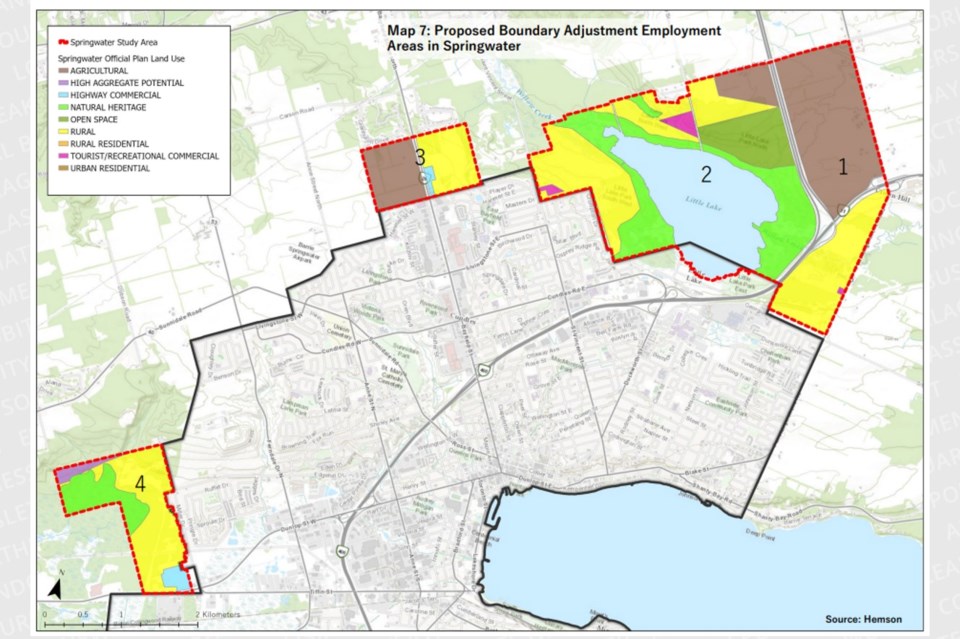Hands off is the message from one of Barrie’s neighbours on boundary adjustments following a joint land-needs analysis and study.
“The Hemson Consulting report confirms the City of Barrie has sufficient employment area lands to meet long-term demand through 2051,” Oro-Medonte Township Mayor Randy Greenlaw said. “The land located in Oro-Medonte requested by the City of Barrie to expand the city’s boundary is not needed nor is it appropriate for industrial purposes.”
These 772 hectares, or almost 1,908 acres, are east of Penetanguishene Road, south of Gore Road, west of Line 1 South and north of the Shanty Bay rural settlement area. This land consists of active farmland and environmentally sensitive features, the township says.
Greenlaw was responding to Barrie Mayor Alex Nuttall’s comments about the Hemson Consulting study, made public Dec. 6 and to be presented — and presumably discussed — on Wednesday during council meetings in Barrie as well as in the townships of Oro-Medonte and Springwater.
On Monday, responding to questions from BarrieToday, an affiliate of BradfordToday and InnisfilToday, Nuttall said “the (Hemson) report was a success. The report states that the case for Barrie is: ‘Relatively strong — for Community Areas and for comprehensive Community/Employment Area uses. If undertaking annexation, should consider including Employment as well Community Area lands.'”
Annexation moves jurisdiction for land from one municipality to another, according to the Ontario government’s definition.
But materials from the presentation Hemson will make Wednesday also state the "case for additional lands for Barrie is: relatively weak — for only employment areas."
Nuttall could not be reached Tuesday for additional comment prior to publication of this story.
Community areas are centred around housing and the supporting infrastructure, services and local retail employment necessary to sustain residential communities.
Oro-Medonte and Springwater have sufficient community area land supply to meet their respective growth forecasts to 2051, Hemson says.
While Barrie’s need for employment area expansion is limited, Hemson says, the city will be facing challenges to accommodate its forecast residential growth within its existing designated greenfield areas due to unachievable density assumptions. Addressing community area shortfalls is critical to meet forecasted housing demand.
“It is noted that Barrie is challenged in meeting the residential density targets set out in their Official Plan, as the density of residential development occurring is not as originally planned,” Greenlaw said.
"“The township understands the importance of the province’s mandate to build more homes faster, and we are prepared to do our part," he added. "We are actively engaged with the development community in Oro-Medonte to assist with filling the provincial objective.”
The City of Barrie has pledged to build 23,000 new homes by 2031. Part of the city’s argument for employment land from its neighbours is that the residents living in these new homes will need jobs.
While Hemson says Barrie likely has sufficient employment area land to meet long-term demands through 2051, a short-term gap exists in "shovel-ready" parcels.
The city is prioritizing infrastructure expansion in south Barrie to address this issue, Hemson says.
Annexation of additional land would not resolve the immediate shortfall due to multi-year timelines for land-use and infrastructure planning and development, Hemson says.
Land in south Barrie holds a "competitive advantage over proposed boundary adjustment" land in Oro-Medonte and Springwater, Hemson says, "due to superior infrastructure, proximity to hubs and fewer constraints."
The Toronto planning consultant firm says Springwater and Oro-Medonte have sufficient long-term employment land until 2051, but accelerated housing growth in Springwater’s Midhurst Secondary Plan Area may necessitate expedited designation of additional employment land to maintain balanced community development.
Future municipal boundary expansions, if required, Hemson says, should integrate both community and employment area needs to foster balanced growth and complete communities and recognize the longer-term planning horizons to consider in such processes.
Hemson gives two options for area land needs.
The first choice maintains municipal boundaries. Growth would slow in Barrie, with some growth shifting to Oro-Medonte and Springwater, likely requiring regional co-ordination and servicing agreements. Slower growth in Barrie may be expected from the mid-2030s (residential) and mid-2040s (employment).
The second choice is to adjust municipal boundaries. The annexation of land to Barrie would address community area needs, requiring detailed evaluation of servicing, fiscal impacts and environmental considerations. Under this option, provision should be made to address future employment area needs before and after 2051.
It’s been more than a year since Nuttall made a presentation to a provincial standing committee that included a proposal to expand Barrie’s boundaries into Oro-Medonte and Springwater, saying it was required because the city does not have enough employment land.
Nuttall has said expanding Barrie’s boundaries could lead to the creation of up to 20,000 new industrial manufacturing and warehousing jobs during the next 20 years.
Barrie is also looking at three parcels of land in Springwater for boundary expansion, totalling 1,324 hectares or almost 3,272 acres.
Contacted by BarrieToday, Springwater Mayor Jennifer Coughlin declined comment Tuesday.
The first phase of the Hemson study carried a cost of approximately $53,000 and Barrie's share was 40 per cent of that total.
Barrie city council will hear a presentation at Wednesday's 7 p.m. meeting on the Hemson Consulting study, receive the report at its meeting and consider approving a more detailed analysis.
Michael Prowse, the city’s chief administrative officer, said this further analysis would also be done by Hemson Consulting.
“This work would take into consideration several criteria including, but not limited to, availability of water, wastewater and other infrastructure, protection of natural features and ecological functions, compatibility with existing uses, financial impacts on the applicable municipalities and consistency with provincial plan policies and conservation authority plans and policies,” he said in a memo.
Wednesday’s meeting, in the Council Chambers at Barrie City Hall, is open to the public and will also be online.




